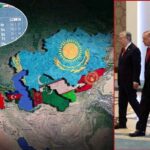The political climate in Turkey indicates a possible resurgence of the Kurdish peace process, an effort that formerly aimed to resolve decades of strife between the Turkish government and Kurdish groups. Recent interactions between MHP head Devlet Bahçeli and pro-Kurdish DEM Party members—contrary to his longstanding opposition—suggest a potential recalibration of the AKP-MHP alliance’s strategy. President Erdoğan’s endorsement of Bahçeli’s moves, along with his appeal for a “genuine reevaluation” of historical events, implies that Ankara may be preparing for a revitalized peace initiative.
Background and Recent Developments
The initial peace process, initiated in 2013, concluded suddenly in 2015 due to an escalation in violence and unsuccessful negotiations, resulting in a more rigid position from Ankara against pro-Kurdish activities and entities believed to be associated with the PKK. Since that time, the political climate has remained strained, characterized by prevailing nationalist sentiment. Nonetheless, the recent acts of reconciliation may indicate a pivotal moment. Bahçeli’s handshake with DEM Party members and his proposal for them to evolve into a “Turkey party” signifies a symbolic yet significant advancement towards inclusivity and communication.
Erdoğan’s subsequent endorsement of this action, coupled with his comments emphasizing the necessity of maintaining “distance from violence” while advocating for democratic politics, may constitute a broader attempt to mitigate domestic tensions. This may indicate an acknowledgment that Turkey’s existing political and economic difficulties require a less adversarial strategy, possibly reinstating communication avenues with the Kurdish population.
The Geopolitical Landscape
The possible resurgence of the Kurdish peace process occurs within Turkey’s navigation of intricate regional and international problems. Amidst the ongoing conflict in Ukraine and the evolving security landscape due to NATO expansion, Turkey’s position as a crucial buffer state has become increasingly significant. Its geopolitical location, connecting East and West, signifies that stability within its territory has extensive ramifications. In this regard, Turkey’s political stability is crucial for its own security and for the broader interests of the West, given its strategic position spanning Europe, Asia, and the unstable Middle East.
The existence of the PKK and persistent Kurdish issues have historically posed an internal security challenge for Ankara, diverting attention and resources that could be allocated to foreign threats and geopolitical strategies. To reinforce its role as a regional stabilizer, Turkey must solve the Kurdish issue. A resolution would liberate resources and political capital, enabling Turkey to address foreign issues, including the increasing influence of China and Russia in Central Asia, the Middle East, and Africa.
Significance of Turkey for the West
A stable Turkey is essential for the West. Turkey, as a NATO member and a conduit between the Middle East and Europe, is crucial in resisting Russian and Chinese aspirations, regulating refugee movements, and ensuring energy security. If Turkey can stabilize its Kurdish issue and reconcile with Kurdish parties such as the DEM Party through a peace process, it would become a more reliable and consistent ally for Western countries. This would augment its capacity to contribute significantly to NATO operations and regional and global security objectives.
Turkey’s Strategic Calculus: Internal Stability as a Foundation for External Power
From Ankara’s viewpoint, addressing or at least alleviating the Kurdish conflict could facilitate a strategic shift. By alleviating domestic tensions, Turkey would be more strategically equipped to confront global threats, particularly those arising from Russia, Iran, and China.
In this context, Erdoğan’s evident willingness for conversation and Bahçeli’s unexpected conciliatory actions may be interpreted as components of a larger strategic framework. If Turkey can extricate itself from the expensive fight with the PKK, it would restore its capacity to tackle the wider geopolitical difficulties it encounters, including opposing the influence of other regional and global actors.
The potential resumption of the Kurdish peace process—if successful—may signify more than a mere domestic realignment; it might radically alter Turkey’s geopolitical approach. By minimizing internal challenges, Turkey would enhance its ability to engage externally, bolstering its position as a regional force and strengthening its role as a vital partner for Western security objectives.
Revitalizing the Peace Process: A Pivotal Moment for Regional Geopolitics?
If the peace process progresses, the ramifications would be significant for both Turkey’s internal stability and regional geopolitics. This would indicate a transformation in Turkey’s strategy, enabling it to adopt a more forceful stance in regional power dynamics, spanning from the Eastern Mediterranean to Central Asia. This may enable Turkey to confront new threats arising from changing alliances and concentrate on overarching strategic priorities, so strengthening its role as a pillar of Western security and hegemony.
Domestic and Opposition Dynamics: An Emerging Political Reality?
The re-establishment of the peace process could also disrupt Turkey’s internal political dynamics. This presents both an opportunity and a difficulty for the opposition, especially the CHP and the newly established coalitions that have arisen in recent years. The CHP has traditionally exhibited ambivalence toward the Kurdish question; nonetheless, it must now maneuver through a political landscape in which the AKP-MHP coalition is redefining itself as a more inclusive entity. This may complicate the opposition’s strategy, necessitating a reevaluation of their position on Kurdish rights and a reassessment of their coalition-building efforts for the upcoming elections.
Should Erdoğan and Bahçeli effectively rejuvenate the peace process under more regulated conditions, they might potentially regain the political initiative, attracting disenchanted Kurdish voters while diminishing the sway of more extreme Kurdish groups. This would enable Erdoğan to portray himself as a statesman adept at resolving enduring internal disputes, so bolstering his narrative of stability and national unity within his “Türkiye Yüzyılı (the Century of Turkey)” vision.
Challenges and Strategic Calculations
A forthcoming peace initiative, or “Kurdish Peace Process II,” necessitates substantial adjustments from all parties involved. Bahçeli’s longstanding opposition to any form of Kurdish political autonomy has previously posed a significant obstacle, rendering his abrupt change of position particularly unexpected. The action may aim to garner Kurdish support or to proactively mitigate any divisions within the nationalist faction, particularly in light of escalating regional instability and geopolitical changes.
Erdoğan also possesses strategic considerations at work. Given the strain on Turkey’s economy and the approaching political cycle, implementing a reconciliation strategy may alleviate domestic turmoil and establish him as a unifying leader. Nonetheless, this action jeopardizes the support of his nationalist constituency if it is viewed as excessively accommodating to Kurdish factions.
The Path Forward
Currently, the conversations are confined to a symbolic level, however, foundational efforts are underway for more extensive involvement. The potential resurgence of the Kurdish peace process, should it occur, is expected to advance gradually, with meticulous consideration given to balancing nationalist aspirations and the pursuit of Kurdish rights. This process would be intricate and laden with difficulties since both sides are wary of repeating the mistakes of the past.
If successful, “Kurdish Peace Process II” might redefine Erdoğan’s legacy and alter the Turkish political landscape, providing a potential avenue for settling one of Turkey’s most enduring and entrenched disputes. The forthcoming months will be pivotal in ascertaining whether these gestures will evolve into tangible actions toward peace or persist as mere symbolic gestures in a tumultuous political landscape.
While “Kurdish Peace Process II” remains in its infancy, the stakes are high. A successful peace initiative could enable Turkey to redirect its focus from internal unrest to external strategy, reinforcing its leverage in both regional and global power games. In the end, whether this potential peace process leads to meaningful change or remains a symbolic gesture will depend on Erdoğan’s ability to navigate the complex internal and external dynamics shaping Turkey’s future.
By: NAT Editorial Team



